Related Research Articles

Fort Valley State University is a public land-grant historically black university in Fort Valley, Georgia. It is part of the University System of Georgia and a member-school of the Thurgood Marshall College Fund.

Lucy Craft Laney was an American educator who in 1883 founded the first school for black children in Augusta, Georgia. She was principal for 50 years of the Haines Institute for Industrial and Normal Education.
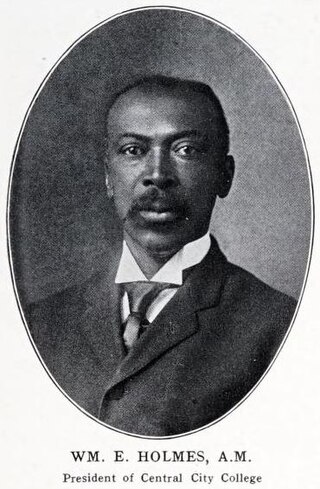
William Eve HolmesSr. was an American Baptist minister and educator and president of Central City College in Macon, Georgia, for 25 years. Before his term at Central City, he was a professor at the Atlanta Baptist Institute. He was also secretary of the board at Spelman College.

Edward McKnight Brawley was an American educator and minister in North Carolina and South Carolina. He was the first African American to attend Bucknell University. He was an important figure in the development of the African-American church in South Carolina and the American southeast and helped found numerous churches and schools, including the Benedict Institute and Morris College. He served as president at Morris and, earlier, at Selma University. Later in his career he was a professor at Shaw University. He was also a prominent pastor at numerous churches and an important figure in civil rights and religious affairs.

Addie Waites Hunton was an African-American suffragist, race and gender activist, writer, political organizer, and educator. In 1889, Hunton became the first black woman to graduate from Spencerian College of Commerce. She worked for the Young Women's Christian Association (YWCA), served as the national organizer for the National Association of Colored Women (NACW) from 1906 to 1910, and served in the U.S. Army during World War I. Hunton was a regular participant in the work of the Equal Suffrage League.

Silas Xavier Floyd was an African-American educator, preacher, and journalist. Active in Augusta, Georgia, he was a writer and editor at the Augusta Sentinel and later wrote for the Augusta Chronicle. In 1892 he co-founded the Negro Press Association of Georgia. He was pastor at Augusta's Tabernacle Baptist Church and was a prominent agent of the International Sunday School Convention. He was also a public school principal and an officer of the National Association of Teachers in Colored Schools.

Dinah Watts Pace (1853–1933) was an American educator who founded black schools in Covington, Georgia and later founded the Covington Colored Children's Orphanage, which she ran for over forty years. Raised as a slave, she received her diploma in education from Atlanta University and gained a nationwide reputation for her charitable work with orphans.

Georgia Mabel DeBaptiste was an African-American journalist, teacher and social worker from Chicago. After completing her education, she taught at various notable black schools before becoming the first woman of African descent to be employed at the Chicago Post Office.
Ada Belle Dement was an American educator and clubwoman. In 1941, she became president of the National Association of Colored Women's Clubs (NACWC).

Nellie E. Brown Mitchell was an American concert singer and music educator, "one of Boston's favorite cantatrices."

Mary Jackson McCrorey was an American educator, mission worker, and leader in the Young Women's Christian Association (YWCA).
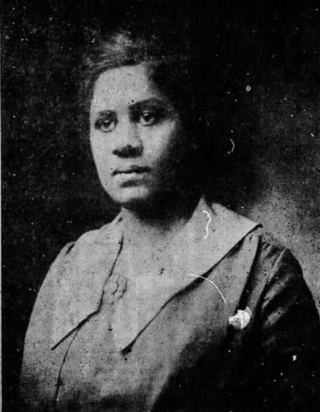
Ora Brown Stokes Perry (1882–1957) was an American educator, probation officer, temperance worker, suffragist, and clubwoman based in Richmond, Virginia.
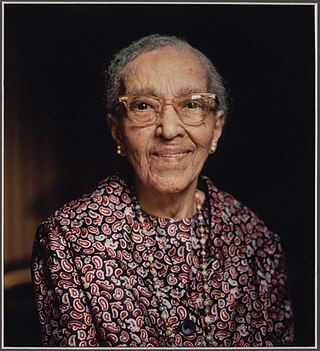
Bazoline Estelle Usher was an American educator known for her work in the Atlanta Public Schools. As director of education for African-American children in the district prior to integration, she was the first African American to have an office at Atlanta City Hall. She founded the first Girl Scout troop for African-American girls in Atlanta in 1943. Her career as an educator lasted over 50 years, over 40 of which were in the Atlanta schools. A school in Atlanta is named for her, and in 2014 she was posthumously named a Georgia Woman of Achievement.

Ione Elveda Wood Gibbs was an American educator, journalist, and clubwoman. She served as vice-president of the National Association of Colored Women from 1912 to 1914.

Ernestine Jessie Covington Dent was an American pianist, music educator, and community leader. She was the wife of Dillard University president Albert W. Dent, and the mother of poet and activist Thomas Dent.
Helena B. Cobb was an American educator and missionary from Georgia. Born in Monroe County, Georgia, she attended Atlanta University and served as an educator and principal at many schools for African Americans in the state. She was also active in organizing and pushing for greater missionary opportunities for women within the Colored Methodist Episcopal Church. In the early 1900s she founded Helena B. Cobb Institute in Barnesville, Georgia.

Martha Broadus Anderson, later Martha B. Anderson-Winn or Martha B. Winn, was an American singer based in Chicago, and vice-president of the National Association of Negro Musicians.
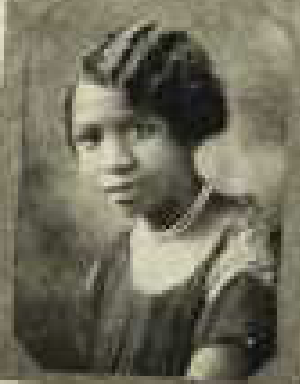
Ethna Beulah Winston was an American educator. She was dean of women and chair of the education department at Tougaloo College in Mississippi, and dean of women at Clark Atlanta University.
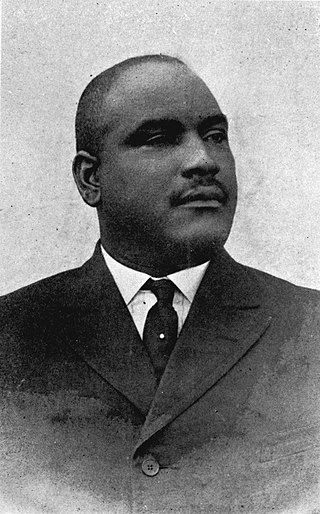
George Rubin (Reuben) Hutto was an American educator, prominent member of the Knights of Pythias, and a delegate to the first and third Pan-African Congresses.
References
- ↑ Richards, Clement, ed. (1919). The National Cyclopedia of the Colored Race. Vol. 1. Montgomery, Alabama: National Publishing Company, Inc. p. 133.
- ↑ Caldwell, A. B., ed. (1920). History of the American Negro and His Institutions (Georgia ed.). Atlanta, Georgia: A. B. Caldwell Publishing Co. pp. 9–10.
- 1 2 3 "Hutto School Historical Marker". Historical Marker Database. Retrieved 2024-07-11.
- ↑ Nidi, Emanuele (2023-06-30). ""Rien pour la révolution, tout par l'éducation": The Talented Tenth at the Second Pan-African Congress". European Journal of American Studies. 18 (2): 7–8. doi:10.4000/ejas.20347. ISSN 1991-9336.
- ↑ Official Program of the Fourth Pan-African Congress (PDF). 1927. p. 1.
- ↑ "Women Baptists Hold Anniversary Meeting at Zion". The State. 25 June 1938. Retrieved 13 July 2024– via Newspapers.com.
- ↑ "Mrs. Williams to Preside For State Federation Executive Meet". The Macon News. 31 December 1941. Retrieved 13 July 2024– via Newspapers.com.
- ↑ "Mrs. Addie Hutto, Noted Educator, To Be Honored By Fort Valley College". The Macon Telegraph. 19 July 1943. p. 1. Retrieved 13 July 2024– via Newspapers.com.